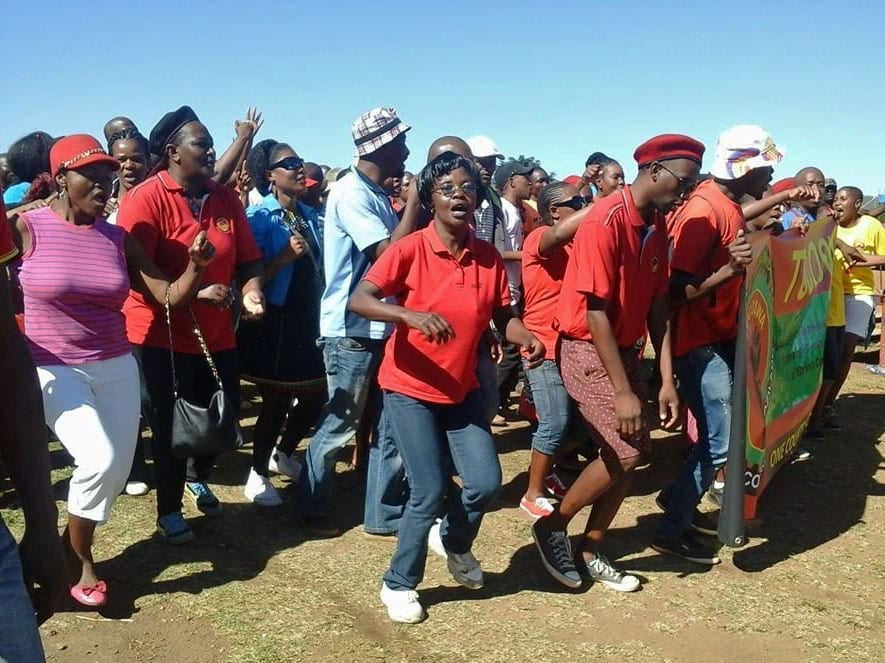
Jul 14, 2015
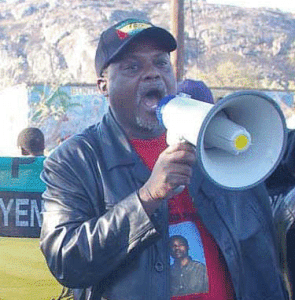
Swazi human rights leader Mario Masuku was released from prison today. Credit: Links
Imprisoned Swazi human rights leader Mario Masuku and student activist Maxwell Dlamini were granted bail today by the Supreme Court of Swaziland, according to the Trade Union Congress of Swaziland (TUCOSWA). The two were charged with terrorism and jailed in May 2014 for slogans they allegedly shouted at a May Day rally.
Masuku and Dlamini were awaiting trial, and if found guilty, each could have faced up to 15 years of hard labor. Masuku, who became seriously ill in prison, was twice denied bail and prison officials would not allow his doctor to see him. In a statement, TUCOSWA praised the release of the two men, noting, “these are but a few steps, which though appreciated, must tell all of us not to lessen our resolve for change in Swaziland.”
The action follows the acquittal and release early this month of Thulani Maseko and Bheki Makhubu. Maseko, a human rights lawyer, and Makhubu, a newspaper editor, were arrested in March 2014 for writing about government corruption and judicial independence and were serving two-year prison terms.
TUCOSWA continues to be a consistent leader in support of union leaders, journalists and human rights activists who have been threatened with violence, arrest, prosecution for their human rights advocacy. Swazi police have harassed members of TUCOSWA, a Solidarity Center ally, breaking up their union meetings and banning rallies.
In May, an international delegation of union leaders traveled to Swaziland, calling on the government to guarantee the rights of workers to freely form unions and exercise freedom of speech and assembly. Led by Wellington Chibebe, International Trade Union Confederation (ITUC) deputy general secretary, and joined by Jos Williams from the AFL-CIO Metropolitan Washington Labor Council and Richard Hall from the Solidarity Center, the fact-finding group found that repressive legislation used by police against union activities had not been addressed by Parliament, even as the government continues to imprison human rights activists for exercising their right to freedom of speech.
Just days before the delegation arrived on May 14, the Swaziland government announced it had registered TUCOSWA after a three-year delay since the federation’s founding.
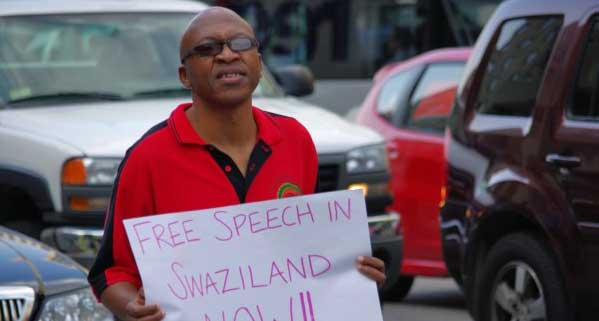
May 16, 2015
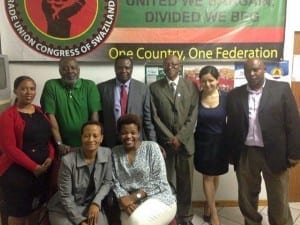
AFL-CIO Metropolitan Washington Labor Council President Jos Williams (green shirt) is part of an international union delegation to Swaziland. Credit: STAWU
An international delegation of union leaders traveling in Swaziland is calling on the government to guarantee the rights of workers to freely form unions and exercise freedom of speech and assembly, and says repressive legislation used by police against union activities still has not been addressed by Parliament, even as the government continues to imprison human rights activists for exercising their right to freedom of speech.
Led by Wellington Chibebe, International Trade Union Confederation (ITUC) deputy general secretary, the fact-finding group is looking into the ongoing government repression directed at Swazi union leaders and human rights proponents, and plans to issue a report to the ITUC and to several members of the European Parliament by the end of May.
Just days before the delegation arrived on May 14, the Swaziland government announced it had registered the Trade Union Congress of Swaziland (TUCOSWA), an action it has refused to take for the past three years.
But delegation members say they are not celebrating the action because the government “did not do more than it was supposed to do,” says Jos Williams, president of the AFL-CIO Metropolitan Washington Labor Council, speaking from Swaziland. “We do not see that as a victory of any kind.” Williams is among a six-member delegation that includes a representative from the Congress of South Africa Trade Unions (COSATU).
In fact, two days after the government announced TUCOSWA’s official registration, police massed outside a meeting of TUCOSWA affiliates in a show of force, according to TUCOSWA Secretary-General Vincent Ncongwane.
“All that has been told (by the government) to the world is just playing to the public gallery,” Ncongwane says, while the reality of repression in a monarchical government that outlaws political parties continues. Twice this year, police have broken up TUCOSWA union meetings, injuring a union leader in the process. On May Day, brave union members held rallies despite a government ban on public gatherings.
The ITUC is demanding the government repeal anti-terrorism laws that enable it to imprison union leaders and others who call for democracy; provide full recognition of union activities in accordance with international laws; and support freedom of speech, assembly and association.
“The government must meet the demands the ITUC delegation has made if the ITUC is to give a favorable report by the end of the month,” Williams says. “From my standpoint, the actions of the government have not been very encouraging. Yes, they have recognized the union, but regarding the other demands we made, there has been no response.”
Delegation members also sought to visit political prisoners, some of whom have been held for two years. So far, says Williams, they “have gotten the run-around” in efforts “to see our comrades in jail and look at the conditions.” (You can sign a LaborStart petition demanding their release. If you Tweet, use the hashtag #SwaziJustice.)
In June 2014, the U.S. government took the rare step of suspending African Growth and Opportunity Act (AGOA) trade benefits for Swaziland, citing the Swazi government’s systematic violations of fundamental worker rights, including refusal to legally recognize TUCOSWA. In addition, the 2014 U.S. State Department human rights report cited serious human rights violations in Swaziland, including arbitrary or unlawful killings by the government or its agents and severely restricted freedom of assembly, including violence against protestors.
Given the level of harassment and repression, Williams says he “came here seeking to encourage” union leaders, but instead found that “they are standing tall in the face of adversity.
“It is rewarding to me as a trade unionist to have drawn strength from these individuals.”
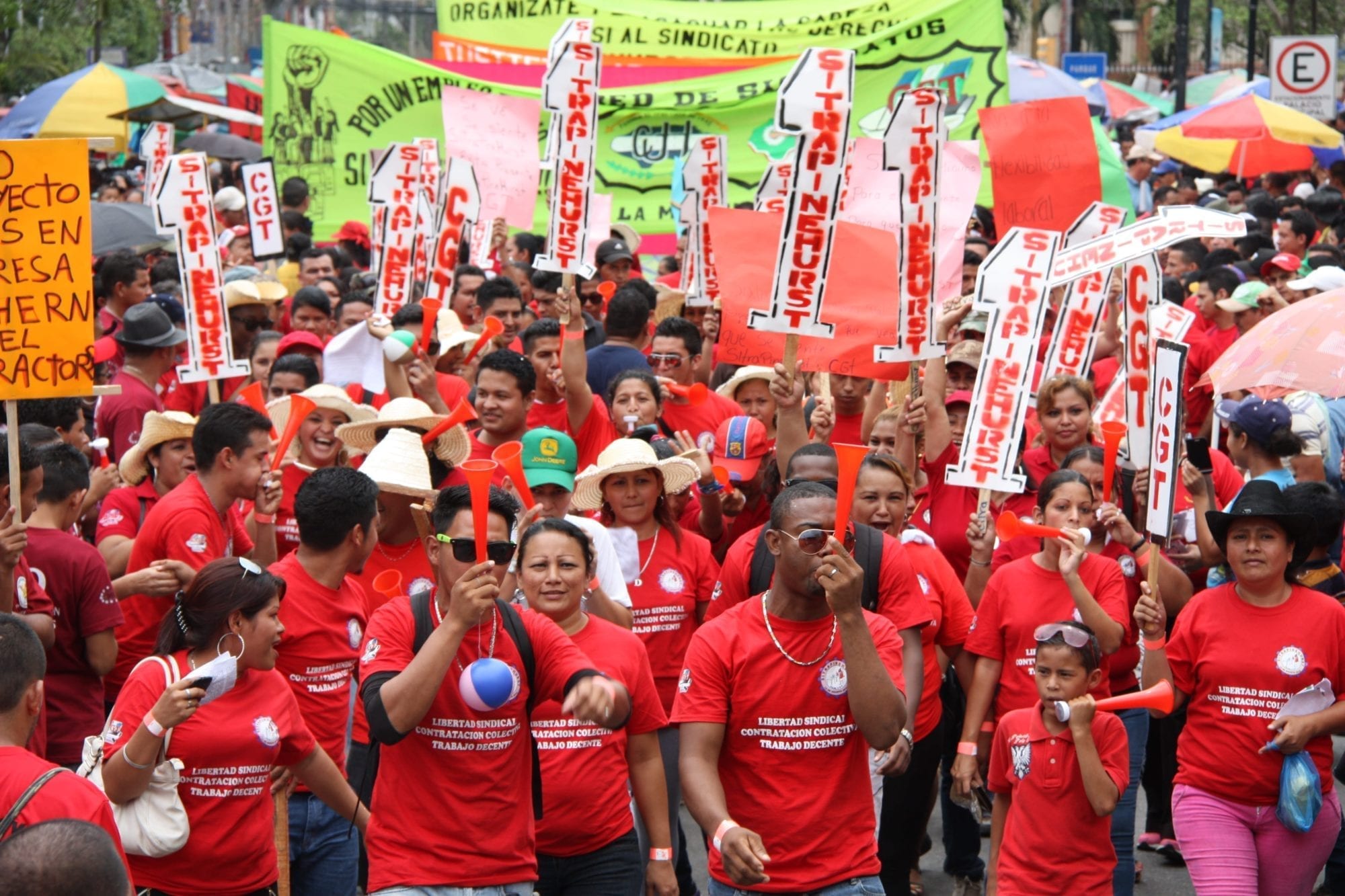
May 5, 2015
Hundreds of thousands of workers and their unions around the world marked International Workers Day May 1. For many, the day provided a time to push for living wages and safe workplaces. Yet this year, governments in some countries like Bahrain and Swaziland banned May Day celebrations or threatened workers with retaliation if they turned out—and some brave workers defied these edicts to exercise their freedom to gather in public spaces.
Elsewhere, workers like those in Bangladesh who often are prevented from forming unions or exercising their fundamental worker rights, called for the freedom to join unions and correct workplace injustices.
Sumi Begum, 25, a Bangladeshi garment worker, says that she and other workers at her factory have not received salaries or overtime pay for the past two months, but they cannot raise the issue with the manager because they fear they would be terminated if they did so.
“Garment factories that have union are not facing these kinds of problems,” she says. “The condition of those garment industries is much better than ours.”
[portfolio_slideshow id=4427]
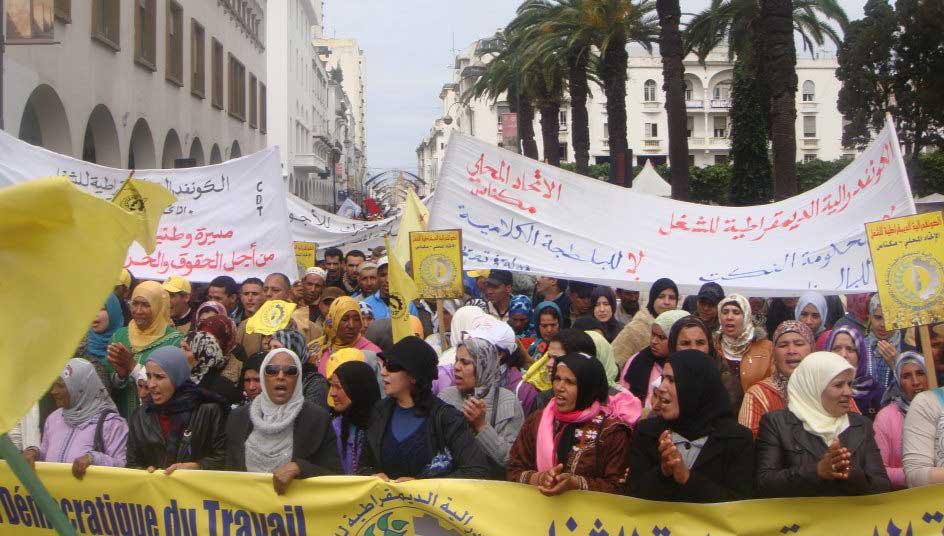
May 1, 2015
Workers in Bahrain, Burundi, Morocco, Swaziland and Turkey are standing strong in the face of economic and political threats this May Day.
May 1 is generally a time when workers around the world celebrate the dignity of work and working people’s social and economic achievements. But this year, governments in some countries have banned May Day celebrations, while elsewhere, workers are forced to protest lack of progress in attaining their share of economic prosperity.
Working women and men are undaunted by intimidation and, in some cases, risking their lives to exercise their freedom to gather in the public space and stand up for their rights. This year more than ever, May Day stands as a beacon for internationally recognized human and labor rights. Here’s a roundup.
Bahrain: The government on April 30 banned all May 1 rallies, forcing the General Federation of Bahrain Trade Unions (GFBTU) to abruptly cancel its weekend celebrations. The federation had planned a rally, medical camps, family outings and award ceremonies focusing on the rights of women and migrant workers in the workplace. Thousands were expected to attend the rally, including members of more than 45 GFBTU-affiliated trade unions.
Burundi: Hundreds of journalists and human rights activists have been arrested and Internet has been inaccessible in the capital, Bujumbura, in recent days following protests against the re-election bid of President Pierre Nkurunziza. Some journalists have been “beaten up and workplaces forced to close down,” one journalist told allAfrica. Civil society organizations and political movements have been denied the right to hold public meetings and assemblies. The Confédération Syndicale du Burundi (COSYBU) and the Organization of Free Unions of Burundi (CSB) cancelled May 1 festivities because of the country’s insecurity.
Morocco: The Moroccan union movement is boycotting May 1 celebrations and instead turning May into a month of protest. The Moroccan Labor Union (Union Marocaine de Travail), the Democratic Confederation for Labor (Confédération Démocratique du Travail) and the Democratic Federation for Labor (Fédération Démocratique du Travail) and others will protest the lack of movement in improving civil servants’ salaries, increasing the minimum wage and boosting minimum pension, per an agreement with the government in April 2011.
Swaziland: Despite a ban on May Day rallies, the Trade Union Congress of Swaziland (TUCOSWA) is encouraging members to turn out and “celebrate their day and not be prevented by actions that are at best unlawful.” Police announced that only “recognized unions” will be allowed to mark May Day. The authorities have refused to recognize TUCOSWA, and police have repeatedly broken up TUCOSWA meetings this year, injuring at least one union leader. “Our members are geared for their celebrations and will not be prevented by threats from the police,” says TUCOSWA Secretary-General Vincent Ncongwane.
Some Swazi pro-democracy activists and trade unionists have been imprisoned. Sign a LaborStart petition demanding their release. If you Tweet, use the hashtag #SwaziJustice.
Turkey: After hundreds of workers defied a ban on May Day rallies in Istanbul, riot police fired tear gas and water cannon on protestors in the city’s central Taksim Square. Unions had called on the government to lift its ban on “illegal demonstrations,” in Taksim. Much of Istanbul’s public transport is shut down and police helicopters are circling over the city.
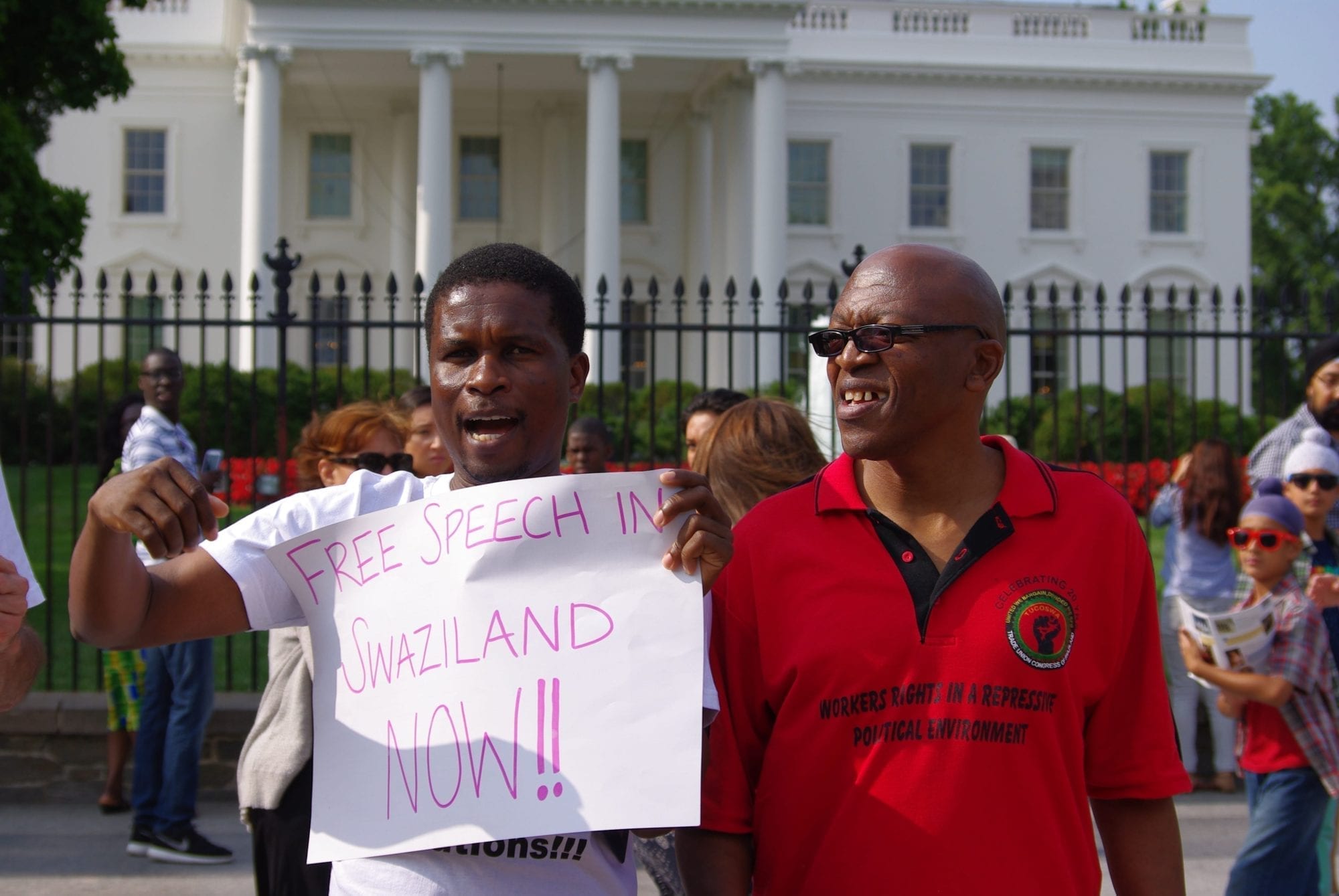
Apr 13, 2015
Swaziland’s union movement cancelled a planned rally over the weekend after concerns the police would break up the gathering as they have multiple times in the past several weeks. In February and March, large numbers of police disbanded meetings of the Trade Union Congress of Swaziland (TUCOSWA), injuring at least one union leader.
Two weeks ago, the Swaziland National Association of Teachers (SNAT) gathered for a prayer service, when a large number of police showed up and sought to disrupt the event, physically injuring the union’s secretary general in the process, according to union leaders. Union members refused to be intimidated and carried on their service, say union leaders, adding that the government is increasingly prohibiting workers from meeting or publicly speaking out.
“The government of the Kingdom of Swaziland has really ensured that the country is viewed as a democracy only in name … as it continues to crush any get-together organized by TUCOSWA,” says TUCOSWA Secretary General Vincent Ncongwane.
Workers also are enduring large-scale job loss, with 850 textile workers laid off last month, the latest in mass firings targeting in the garment sector.
Ncongwane notes that on April 12, 1973, Swaziland banned political parties. Forty-five years later, when Swazi workers sought to commemorate “the day democracy died in Swaziland,” workers again were denied their fundamental democratic rights.
“Imagine the lack of logic of denying workers the right to discuss issues of democracy, among other things, simply at the instruction of a regional commissioner of police and not because of any violation of any law but because of a misplaced fear that would be dangerous for the country,” Ncongwane says. “That makes our country so fragile.”
The 2014 U.S. State Department human rights report cited serious human rights violations in Swaziland, including arbitrary or unlawful killings by the government or its agents; severely restricted freedom of assembly, including violence against protestors; jailing of trade union leaders; the deregistration of TUCOSWA and the banning of strikes.
“We have seen numerous countries being changed, and drastically, so when the tide starts to turn against suppression, Swaziland cannot be the exception,” Ncongwane says.
TUCOSWA is now planning a May 1 public event, and is seeking a court order allowing the action to take place.
In June 2014 the U.S. government took the rare step of suspending African Growth and Opportunity Act (AGOA) trade benefits for Swaziland, citing the Swazi government’s systematic violations of fundamental worker rights, including refusal to legally recognize TUCOSWA. Swaziland’s trade unions support AGOA, but maintain that the country must meet benchmarks of the agreement, which include respecting human rights and labor rights.







